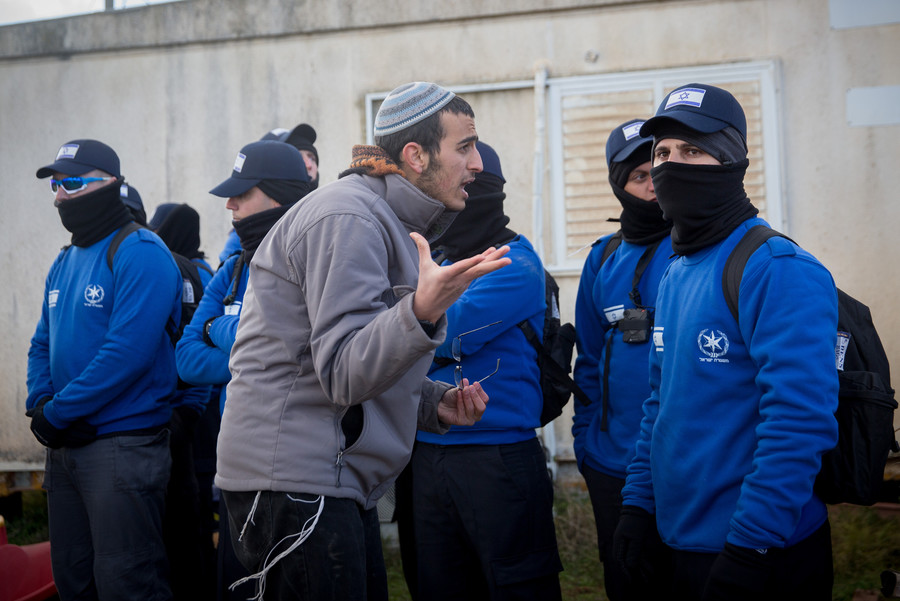Despite Amona, settlers expect to win
AMONA — In a dramatic clash with residents of this hilltop outpost, the state seemed to have won.
Over two sometimes violent days, security forces evacuated the residents, along with hundreds of protesters, as ordered by Israel’s High Court of Justice. Yet afterward, the settlers did not seem defeated.
“We are winning the war for the West Bank,” said Eli Greenberg, an Amona resident who has served as a spokesman for the community. “I have no doubt I will live to see Amona rebuilt.”
It was easy for Greenberg and others to point to victories. During the political and legal skirmishes over Amona, the state approved thousands of new homes for settlers, including a new settlement to replace the outpost, and acted to end future evacuations. The Trump administration, some noted, barely blinked.
In an effort to save Amona, coalition lawmakers in November proposed the “regulation bill,” which would allow the state to seize private Palestinian land on which settlements were built. The bill passed this week.
Meanwhile, as Donald Trump moved into the White House, Prime Minister Netanyahu acted to advance the settlement movement. In the two weeks after President Trump’s inauguration on Jan. 20, Netanyahu approved the building of more than 6,000 new homes for settlers, some of them outside the Judea and Sumaria settlement blocs that Israel expects to keep in a future peace deal with the Palestinians. As Amona was being evacuated, the prime minister announced that he had approved a new settlement to replace the doomed outpost.
The Trump White House, after first declining to comment on the approvals, issued a statement on Thursday, saying only: “While we don’t believe the existence of settlements is an impediment to peace, the construction of new settlements or the expansion of existing settlements beyond their current borders may not be helpful in achieving that goal.”
Settlement supporters have seen other signs that Trump is on their side, including his appointment of David Friedman, a vocal advocate and fundraiser for settler causes, as ambassador to Israel and his invitation of a settler delegation to his inauguration.
“What I see about Trump is it’s amazing how he keeps his promises. I don’t think he will let Israel down,” said Amona resident Elad Ziv. “That’s why we are looking to Netanyahu to keep moving ahead in the West Bank. This is the time for Benjamin Netanyahu to prove himself.”
Politicians to the prime minister’s right have conveyed a similar message. Members of both Netanyau’s ruling Likud party and the fiercely pro-settlement Jewish Home party have advocated annexing parts of the West Bank since Trump’s election.
In a speech to the Knesset plenum on Wednesday, Education Minister Naftali Bennett, who heads Jewish Home, pledged the evacuation of Amona would advance Israeli sovereignty over all of Judea and Samaria.
“We lost the battle, but we are winning the war for the Land of Israel,” he said. “From this legal defeat we will establish a new legal regime in Judea and Samaria that will regulate the entirety of settlements, and from the painful loss of this foothold in this mountain will emerge the State of Israel’s application of sovereignty over all of Judea and Samaria.”
But there are still forces pushing back on such a move.
The head of Israel’s political opposition and the Zionist Union political coalition, Isaac Herzog, favors unilateral separation from the Palestinians. In November, Herzog said the regulation bill amounted to legitimizing theft and called the legal wrangling over Amona a “virus” that endangered Israeli democracy.
Israel’s attorney general, Avichai Mandelbilt, has said repeatedly that the regulation bill was unconstitutional and predicted it would be struck down by the High Court.
Amichai Cohen, dean of the law faculty at Ono Academic College near Tel Aviv, said he wasn’t sure how the High Court would rule on the bill. But he said its passage, which Cohen characterized as a move toward Israeli annexation of the West Bank, could encourage the International Criminal Court to open a formal war crimes investigation against Israeli settlements “even though there are clearly bigger problems in the region.”
The European Union or individual European states might also be more inclined to boycott West Bank goods, he said. While most of the world does not distinguish between settlements built on private Palestinian property and elsewhere in the West Bank anyway, Cohen said, more “in your face” settlement building was liable to trigger a response.

 44.0°,
Mostly Cloudy
44.0°,
Mostly Cloudy 




